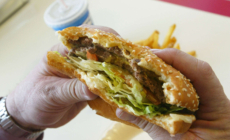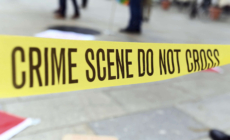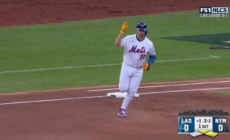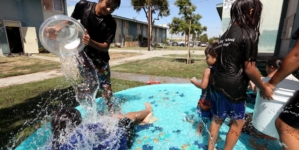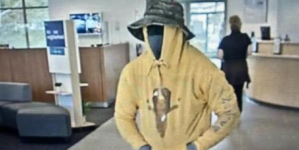-
Alabama-Tennessee Sportsbook Promos: Score $5K in Bonus Bets for SEC Battle - 28 mins ago
-
Nebraska vs. Indiana live updates, score: Top moments from 'Big Noon Kickoff' - 38 mins ago
-
Cheeseburger Recall Issued As BrucePac Listeria Warning Widens - about 1 hour ago
-
Rising crypto scams leave Americans reeling from billions in losses - about 1 hour ago
-
2024 NFL Week 7 Best Bets: Take 49ers, Eagles to cover - about 1 hour ago
-
Philadelphia Mass Shooting Leaves Multiple Injured After 50 Shots Fired - 2 hours ago
-
5 of the coziest slippers you can wear outside - 2 hours ago
-
Francisco Lindor speaks with Alex Rodriguez about the Mets' rollercoaster season | MLB on FOX - 2 hours ago
-
College Football Sportsbook Promos: Top Deals for Week 8 - 2 hours ago
-
Klamath River salmon spotted far upstream in Oregon after dam removal - 3 hours ago
What are the answers to MacArthur Park crisis, and can Councilmember Hernandez lead the way?
L.A. Councilmember Eunisses Hernandez was touring the eastern fringe of MacArthur Park with a medical outreach team when they paused to make sure a shirtless man slumped on a bench was still breathing.
He was, so they moved on to a young man who’d been hit by a car while riding his bike, and then to several people with festering ulcers on their arms and legs, a common side-effect of “tranq,” the veterinary tranquilizer that’s been showing up in street drugs.
“I feel possibility and I feel anger,” Hernandez said as she worked with members of USC Street Medicine to provide health services for the homeless living on Beacon Street in Westlake.
We were surrounded by misery in this apocalyptic landscape created by the ravages of addiction, homelessness and gang-orchestrated criminal enterprise— all of which landed on Hernandez’s doorstep when she was elected two years ago as a progressive, defund-the-police candidate who preached the benefits of care over crackdowns and rehabilitation over incarceration.
In a city that’s been wrestling for years with competing demands for more social services and for greater public safety, no neighborhood is in greater crisis than this one. In the densely packed, mostly-immigrant community Hernandez calls “the Ellis Island of the West Coast,” a 35-acre green space serves as the “front yard and backyard” for tens of thousands of working-class residents. But the fentanyl epidemic is on full display, and the fire station responds to more overdose calls than structure fires. (Through August of this year, there have been 599 drug overdose calls, compared with 36 runs for structure fires.)
California is about to be hit by an aging population wave, and Steve Lopez is riding it. His column focuses on the blessings and burdens of advancing age — and how some folks are challenging the stigma associated with older adults.
USC student journalist Nora Miller just reported for Crosstown, a nonprofit that does data journalism at USC’S Annenberg School of Communications and Journalism, that Westlake leads in homeless encampment complaints by far this year with 4,902 people through August — more than twice as many as downtown L.A.
Some residents of Westlake have told me that conditions deteriorated after Hernandez bounced the more moderate Gil Cedillo from his District 1 Council seat in 2022, not long after Cedillo oversaw a months-long $1.5 million park restoration and cleanup project. But others say those improvements were squandered after Cedillo became a lame duck and later got caught up in the City Hall scandal involving racist comments heard on a secretly captured audio recording.
“I feel possibility and I feel anger,” Hernandez said, glancing around the park, where the new playground she made possible a few months ago is still fenced off after a fire, and where hobbled and hunched-over people wander as if they’re sinking in quicksand, ghosts of their pre-addiction selves.
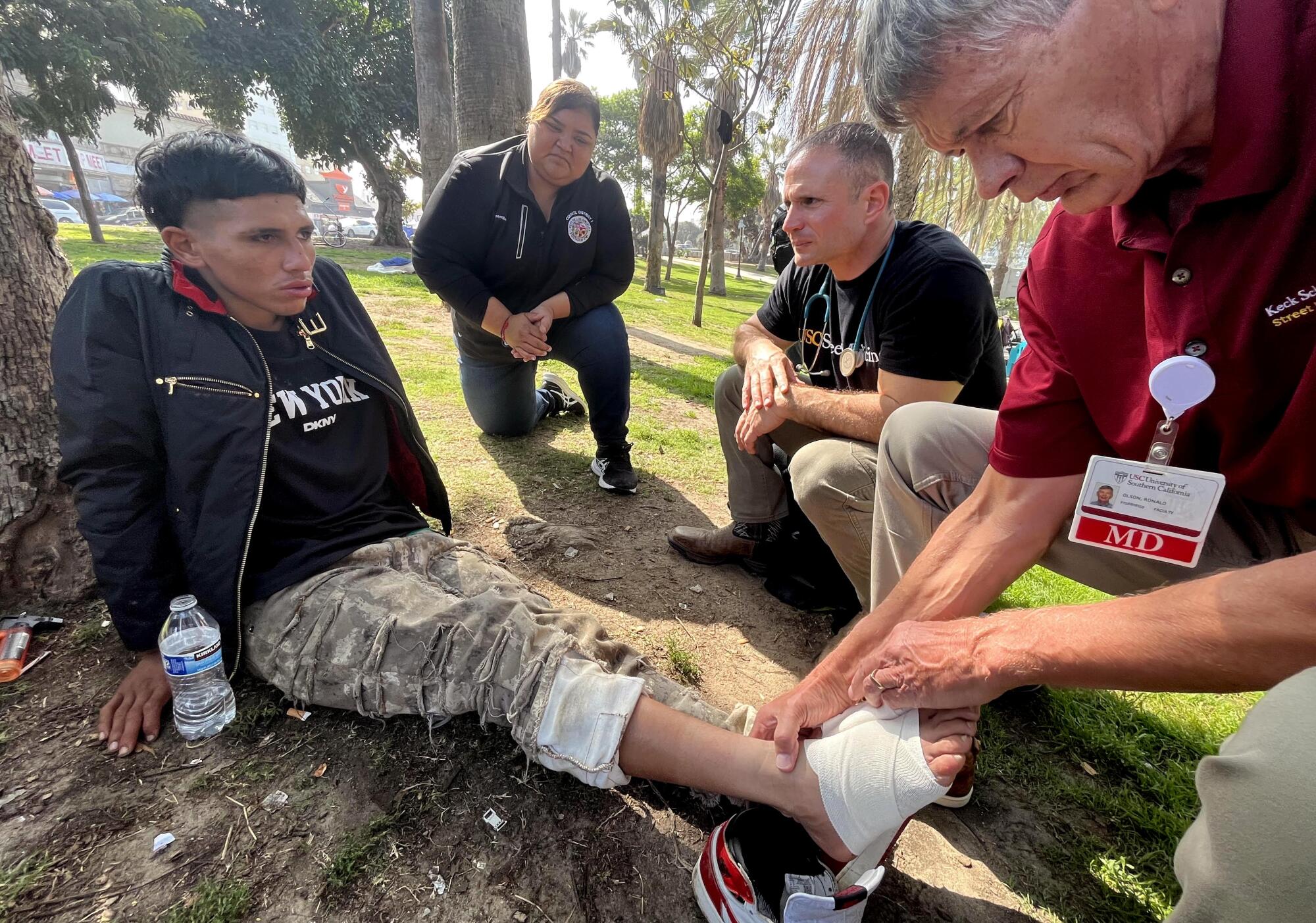
Dr. Ronald Olson, with USC Street Medicine, treats a 21-year-old man as physician assistant Brett Feldman, center, and Hernandez look on.
“We’ve been grinding hard, but it’s just a disappointing factor that others waited too long to do something about it, you know? That’s why it’s festered into this,” Hernandez said.
That may be so, but blame is of little use. Sure, the challenges are enormous, but this is her district now, and she’s going to have to lead the way.
There have been multiple attempts to save MacArthur Park through the years, by the way, and I’ll be detailing some of those efforts in an upcoming column.
Hernandez has her own vision, which leans heavily on the promises she made as a candidate for office following years of work as an activist, with heavy emphasis on social services she insists are grossly underfunded.
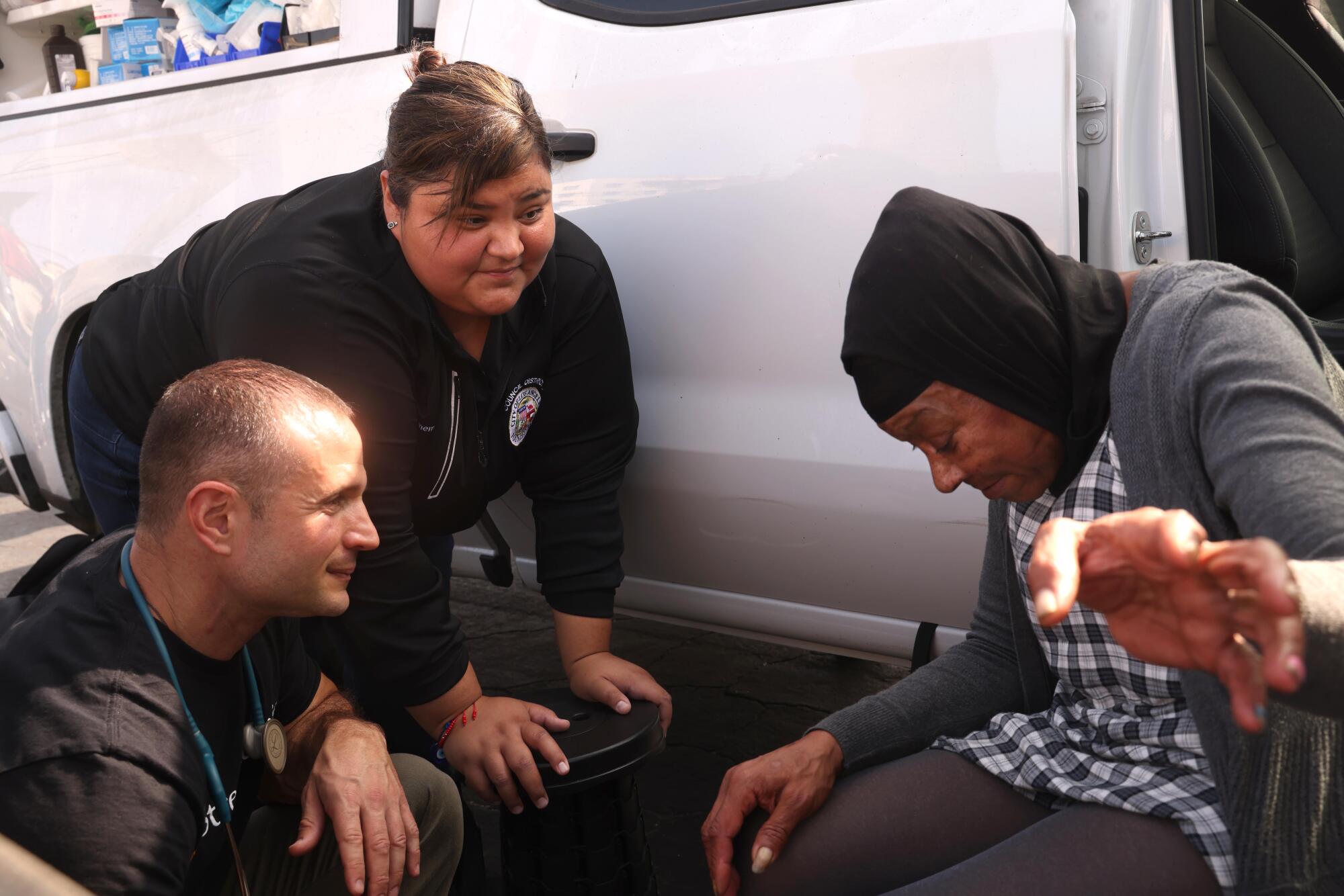
Feldman and Hernandez listen to an unhoused woman with multiple health issues .
“She is not by herself,” said Fernando Guerra, founder of Loyola Marymount’s Center for the Study of Los Angeles. She and other reformers who have knocked L.A.’s traditional liberals out of office “have the wind at their backs” in a city of voters who have become more progressive than ever, he said. (Though it’s worth noting that in the race for district attorney, progressive incumbent George Gascon is polling badly against more conservative challenger Nathan Hochman).
The problem for Hernandez is that bureaucracy and political reality can be mortal enemies of progressive idealism. There’s not nearly enough of any of the resources needed to fund her vision, and officials are wondering what to make of a report that puts the price tag for ending homelessness citywide at $22 billion.
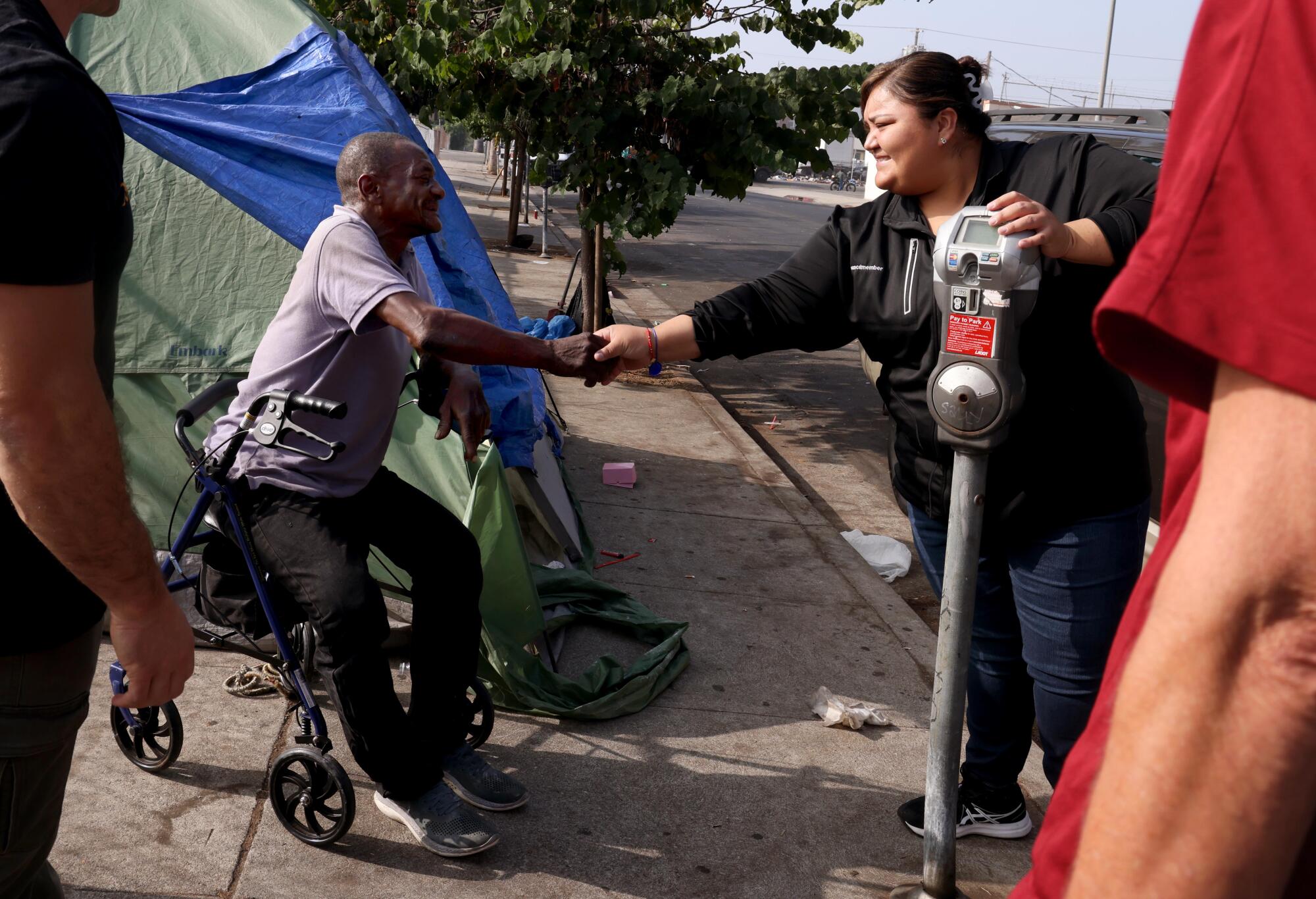
Hernandez greets an unhoused person dealing with severe arthritis before Feldman and Olson treat his bad knee.
Hernandez smiled when I asked if she ever regrets trading the benefits of agitating from the outside for the headache of actual governance on the inside.
“I have that conversation every day with myself and my team,” she said.
“When I was outside, you couldn’t tell me something was impossible, because it’s like, no, we’re going to build the people power,” Hernandez said. “Now it’s the daily grind of pushing through…and not being restricted by the bureaucracy … and reminding ourselves that things are possible. … So we’re trying to learn what levers to push.”
All well and good, but that takes time, and the need is urgent. Hernandez was reminded of this when a local pastor approached as she and the medical team checked on a community of older people who have been living in an encampment for months, several blocks east of MacArthur Park.
Jose Guevara, of Iglesia Mision Christiana, was polite and respectful but complained that he had tried repeatedly, and unsuccessfully, to get help with an encampment and drug use on the edge of church property at 10th and Lake streets in Westlake. Then, in late September, flames from an encampment fire leaped into the church parking lot and destroyed the vehicles of four of his parishioners.
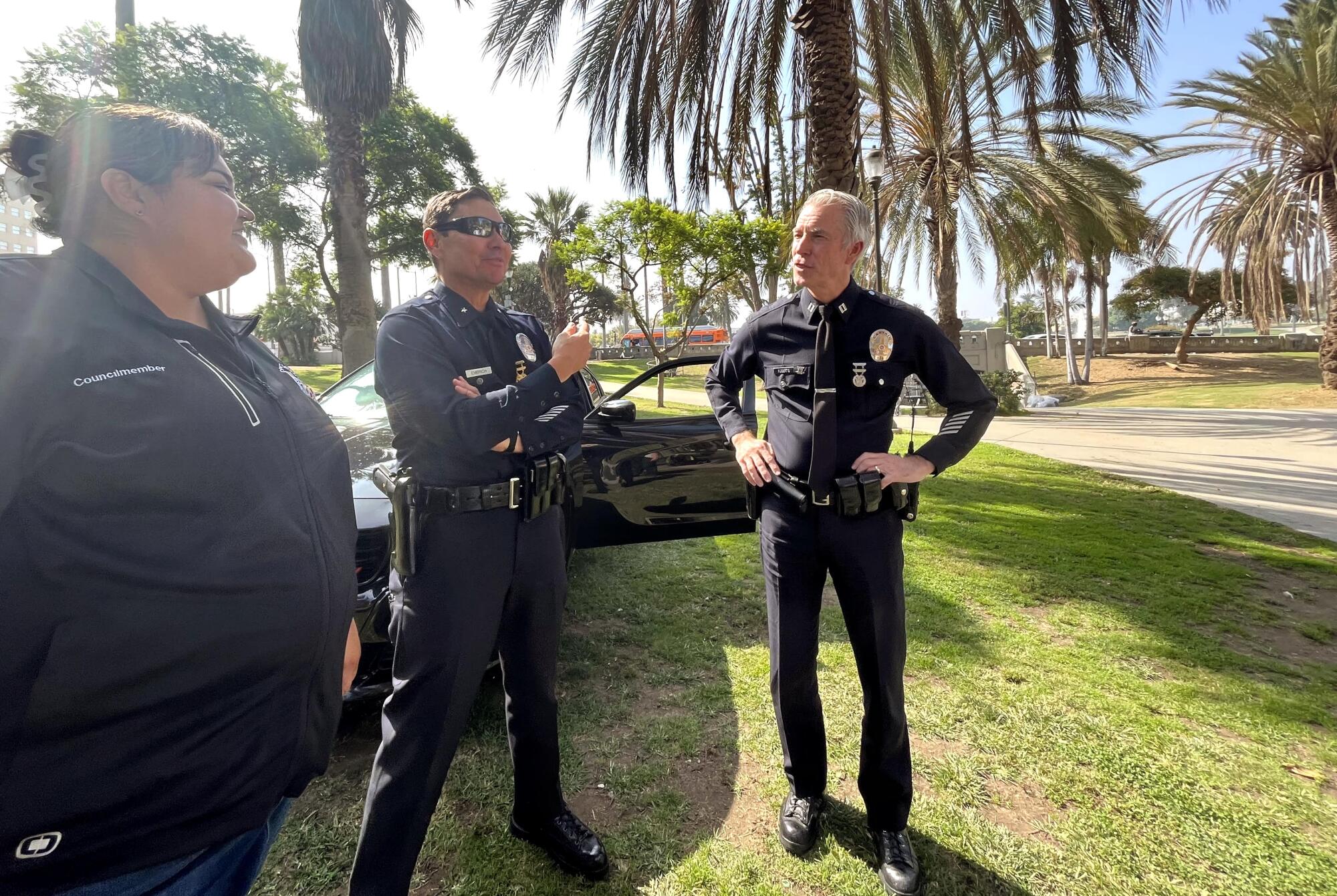
Hernandez, from left, speaks with LAPD Cmdr. Steve Embrich and Rampart Capt. Jay Roberts Jr. in MacArthur Park.
“We literally had to interrupt our worship services” as LAFD station 11 arrived to extinguish the flames,” Guevara told Hernandez. Church staff had to help people whose cars were destroyed get back home, and those are hardworking community members who suffered the damage, the pastor added. Guevara also said a portable toilet at the same site had been torched.
Hernandez and her homeless and housing coordinator, Sophia Li, listened as Guevara said he understands that homelessness and public safety are massive citywide problems.
“Yes,” said Hernandez, there are “37,000 homeless people in the city.”
“As a Christian person,” Guevara said, “my heart goes out, and we serve the community. But this is not the way, and this is not OK.”
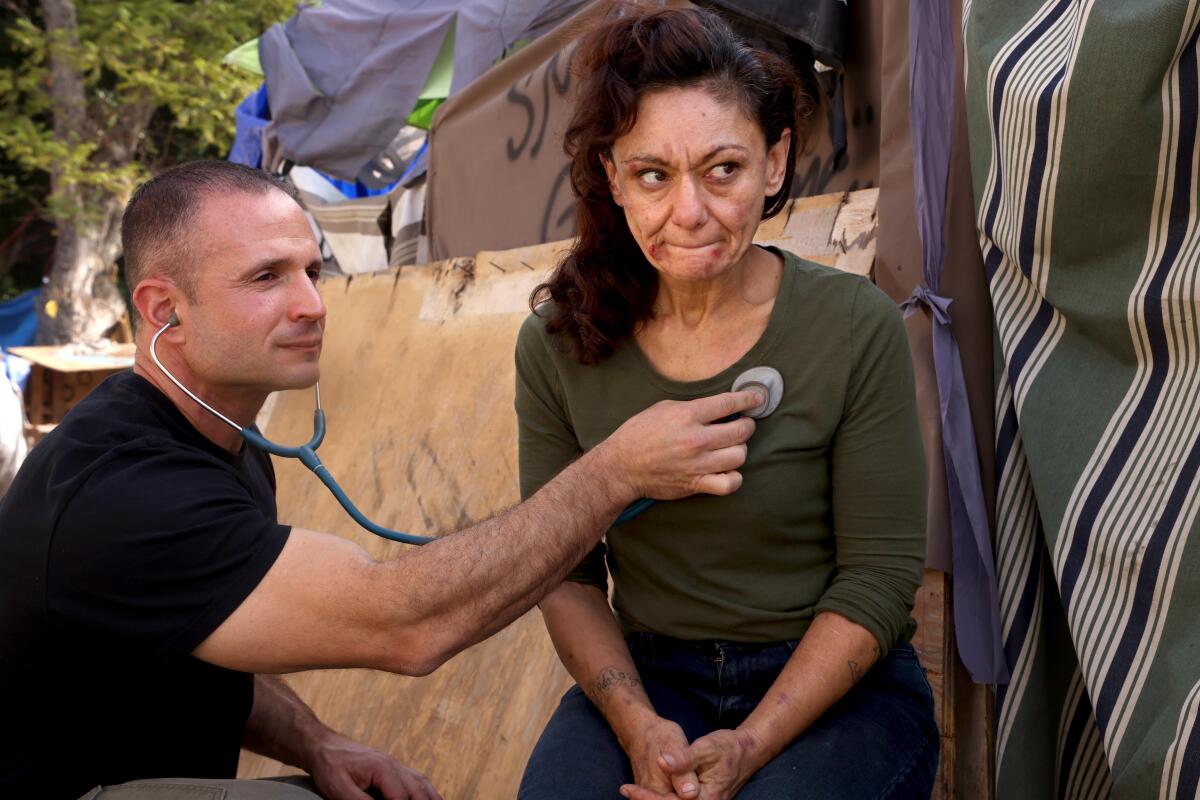
Physician assistant Brett Feldman performs a health check on a 42-year-old woman who has been living along Beacon Street in Westlake.
(Genaro Molina/Los Angeles Times)
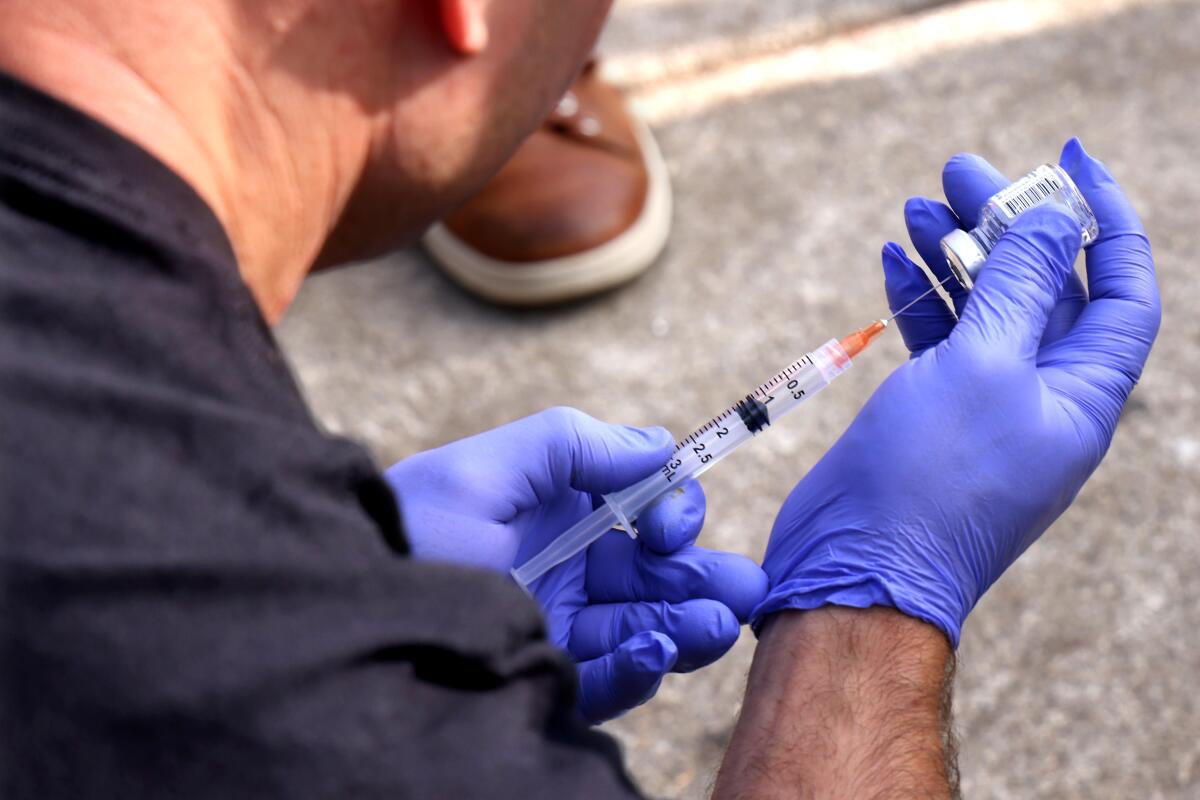
Feldman prepares a steroid injection for an unhoused patient.
Hernandez and Li promised to work on “next step solutions” for homeless people living near the church. For Hernandez, those solutions include moving more people into all types of housing, including permanent and temporary arrangements, and she has had some success in that regard, working in partnership at times with Mayor Karen Bass.
Hernandez has also opened a district office in Westlake, started a mobile overdose response team, secured funding for a homeless services center, and is trying to get funding for a second street medicine team that would focus exclusively on MacArthur Park. She has also funded a trash abatement team and has plans to establish two teams of peace ambassadors whose job will be to reduce tension and gang violence.
All levels of government have “missed the mark,” Hernandez said. “A lack of investment has led to the humanitarian crisis. This doesn’t happen by accident. And so that’s why we’re doing the work to invite everybody — the mayor, Supervisor [Hilda] Solis, senators, assembly members, to please join us to fight this crisis that is happening in MacArthur Park.”
Despite her past comments about defunding the police, Hernandez told me it’s naive to identify her as someone out to abolish the LAPD, because that’s not going to happen. But she does question the size of the LAPD budget at a time when the city takes years to fix broken sidewalks and street lights. And she said she has been in contact with the police, community members, residents and merchants, because no one person or agency can fix the problems.
“Public safety, for me, is a spectrum of holistic responses. It goes from trying to prevent and deter and divert” to appropriate law enforcement initiatives, she said. “We are trying to build the pieces.”
That’s the right approach, but I’m with Pastor Guevara in thinking a sense of urgency is missing in the city of Los Angeles, despite the highly visible evidence of an emergency.
In the park, the medical outreach team handed out glass pipes and test kits that can detect fentanyl or veterinary tranquilizer in drugs before they’re consumed, possibly saving lives. I understand and support the harm reduction strategy — establishing relationships with drug users can open the door to rehab and the end of the suffering.
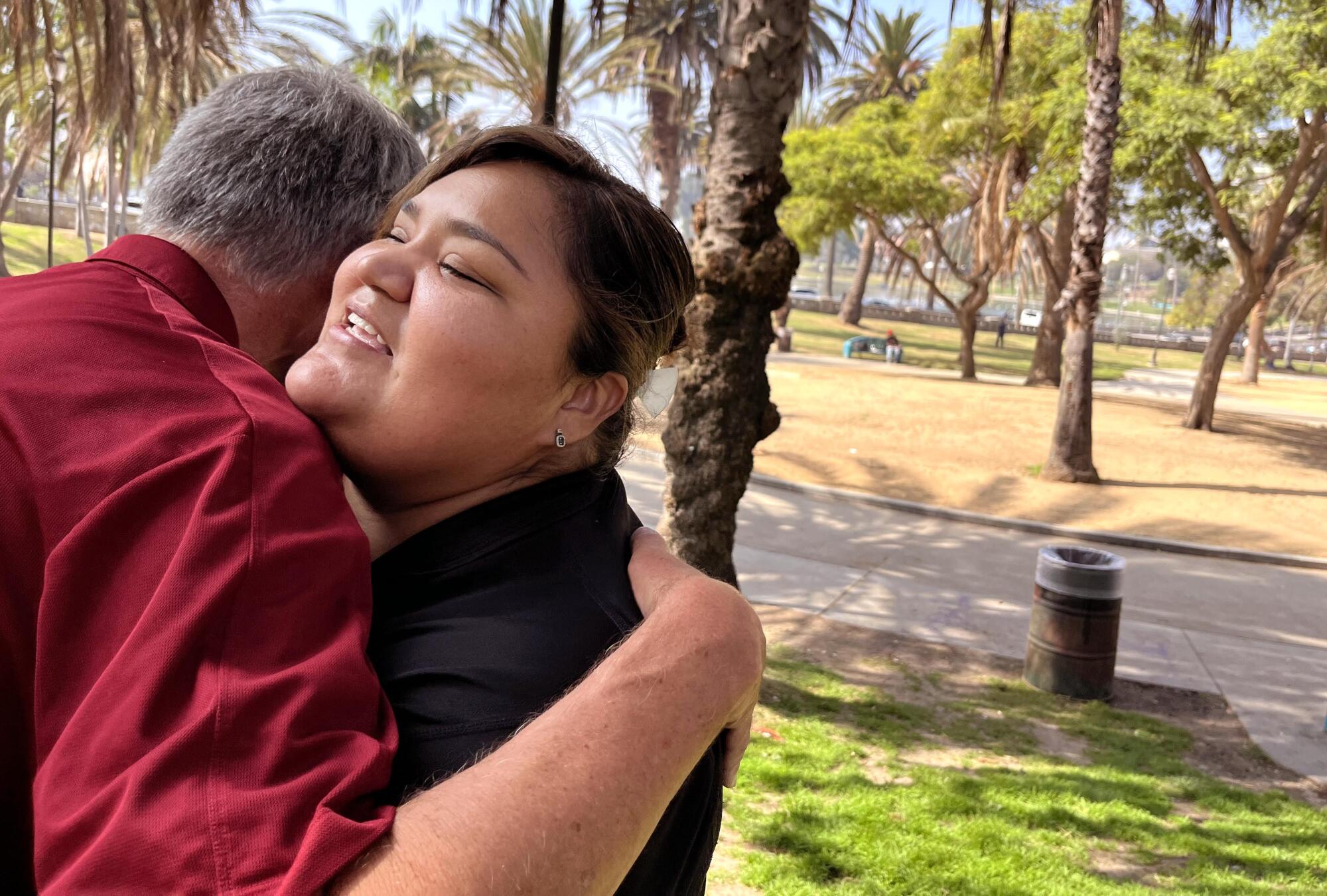
Olson, left, gets a hug of thanks from Hernandez.
But from the ground, where I’ve spent much of the last two months, I haven’t seen enough rehab, or enough of an attempt to make the park safe for kids, or to clean up reeking heeps of trash, or to send a loud and clear message that it’s not OK to sell and buy and use deadly drugs in the open. What about harm reduction for residents who live in the middle of this chaos, or for merchants whose livelihoods are threatened by theft and drug activity that drives away customers?
Why not temporarily shift resources from other sectors, quadruple the outreach, and enforce existing laws? The nation’s war on drugs has largely failed, but that doesn’t mean police have to sit back as city streets become drug bazaars that flourish in plain sight day and night.
Two months ago, when I first wrote about problems in and around MacArthur Park, Mayor Bass took note. On Friday, a spokesman said she “has engaged in an unprecedented and coordinated interdepartmental approach to issues in the community,” including adding additional police officers, with more action to come.
Restoring order has to be the top priority, and if and when that happens, it might be easier to make lasting change with the kinds of transformative social services and quality of life improvements Hernandez was elected to deliver.
As she said, the community deserves this.
steve.lopez@latimes.com
Source link


